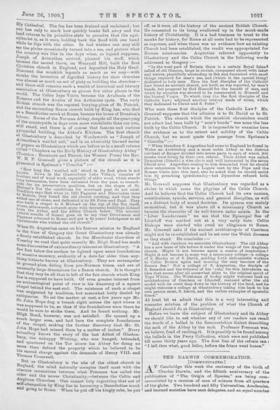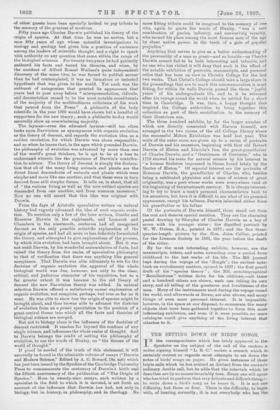THE DARWIN COMMEMORATION. [CommuNicA.TED.1
AT Cambridge this week the centenary of the birth of Charles Darwin, and the fiftieth anniversary of the publication of " The Origin of Species," are being com- memorated by a reunion of men of science from all quarters of the globe. Two hundred and fifty Universities, Academies, and learned societies have sent delegates, and an equal number
of other guests have been specially invited to pay tribute to the memory of the greatest of moderns.
Fifty years ago Charles Darwin published his theory of the origin of species. At that time he was no novice, but a man fifty years of age whose splendid investigations in zoology and geology had given him a position of eminence among the leaders of scientific thought, and a right to speak with authority on any question that came within the range of the biological sciences. For twenty-two years be had patiently gathered his facts and tested his theories, and when, by the accident of Alfred Russel Wallace's quite independent discovery of the same idea, he was forced to publish sooner than he had contemplated, it was no immature or untested hypothesis that was given to the world. Yet such was the outburst of antagonism that greeted its appearance that years bad to pass away before " misrepresentation, ridicule, and denunciation ceased to be the most notable constituents of the majority of the multitudinous criticisms of his work that poured from the Press." A plebiscite of the body scientific in the year 1860 would have shown but a handful of supporters for the new theory ; such a plebiscite to-day would assuredly show an overwhelming majority.
The layman—even the educated layman—still too often looks upon Darwinism as synonymous with organic evolution or the theory of descent, and regards the evolution idea as a sudden revelation for which Darwin was alone responsible; and so when be learns that, in the ages which preceded Darwin, the philosophy of evolution was advanced by more than one of the world's great thinkers, be is apt to be at a loss to understand wherein lies the greatness of Darwin's contribu- tion to science. The theory of descent is simply the declara- tion that all of the many living animals and plants are the direct lineal descendants of animals and plants which were simpler and more like one another, and that these were in turn derived from still simpler forms. It tells us, in short, that all of " the various living as well as the now extinct species are descended from one another, and from common ancestors." Now no one will assert that this idea was original with Darwin.
From the days of Aristotle speculative writers on natural history had vaguely advanced the idea of such organic evolu- tion. To mention only a few of the later writers, Goethe and Erasmus Darwin in the eighteenth, and Lamarck and Chambers in the nineteenth, centuries had all recognised descent as the only possible scientific explanation of the origin of species, and had all more or less definitely formulated the theory, and attempted to give explanations of the process, by which this evolution had been brought about. But it was not until Darwin, by his wonderful accumulation of facts, had raised the theory from the realm of speculative philosophy to that of verification that there was anything like general acceptance. That Darwin was able ultimately to win for the doctrine of organic evolution the approval of the whole biological world was due, however, not only to the clear, critical, and judicious character of his exposition, but to a far greater extent it was because to the old theory of descent the new Darwinian theory was added. In natural selection Darwin offered a satisfactory causal explanation of organic evolution, not complete, perhaps, but true as far as it went. He was able to show how the origin of species might be brought about, and thus helves able to advance the doctrine of evolution from an a priori speculation to the position of a great central theme into which all the facts and theories of biological science are merged.
But not to biology alone is the influence of the doctrine of descent restricted. It reaches far beyond the confines of any single science, and influences the whole realm of thought. And to Darwin belongs the credit of setting the philosophy of evolution, to use the words of Huxley, on " the throne of the world of thought."
If proof be needed of the truth of this statement, it will assuredly be found in the admirable volume of essays ("Darwin and Modern Science," Edited by A. C. Seward, 18s. net) which has just been issued by the Syndics of the Cambridge University Press to commemorate the centenary of Darwin's birth and the fiftieth anniversary of the publication of "The Origin of Species." Here in twenty-nice essays, each written by a specialist in the field to which it is devoted, is set forth an account of the influence that Darwin Las had, not only in biology, bet in history, in philosophy, and in theology. No
more fitting tribute could be imagined to the memory of one who, again to quote the words of Huxley, " was a rare combination of genius, industry, and unswerving veracity, who earned his place among the most famous mon of the age by sheer native power, in the teeth of a gale of popular prejudice."
Anything that serves to give us a better understanding of the personality of a man so great—and so lovable—as Charles Darwin cannot fail to be both interesting and valuable, and no one who has visited it will deny'that such is the effect of the notable exhibition of portraits, manuscripts, and personal relics that has been on view in Christ's College for the last two weeks. That Christ's College should take a large share in the proceedings that are to mark this commemoration is most fitting, for within its walls Darwin passed the three " joyful years" of his undergraduate life, and to it he returned after his voyage round the world when he settled for a short time in Cambridge. It was, then, a happy thought that inspired the College authorities to bring together this collection as part of their contribution to the memory of their illustrious son.
The three hundred exhibits, by far the larger number of which are directly connected with Darwin himself, are arranged in the two rooms of the old College library where the successful Milton Exhibition was held last year. The walls of the outer room are given up to a series of portraits of Darwin and his ancestors, beginning with that old Robert Darwin of Elston and Lincoln's Inn, the great-grandfather of Charles Darwin, and a "Gentleman of Curiosity," who in 1719 showed his taste for natural science by his interest in "a human Sceleton impressed in Stone, found lately by the Rector of Elston." Of especial interest aro the portraits of Erasmus Darwin, the grandfather of Charles, who, besides being a celebrated physician and a man of science of great originality, was a poet whose works were everywhere read at the beginning of the nineteenth century. It is always interest- ing to try to trace a man's personal characteristics back to his ancestors, but here it is difficult to see what of his personal appearance, except his tallness, Darwin inherited either from his grandfather or his father.
Of the portraits of Darwin himself, three stand out from the rest and deserve special mention. They are the charming pastel drawing by Sharpies of Charles Darwin as a boy of seven with his younger sister ; the dignified portrait by W. W. Ouless, R.A., painted in 1877; and the fine three- quarter-length picture by the Hon. John Collier, painted for the Linnean Society in 1881, the year before the death of time sitter.
By far the most interesting exhibits, however, are the manuscripts, letters, and notes extending over a period from childhood to the last weeks of his life. The MS. journal kept during the voyage of time ' Beagle ' ; time earliest note- book on evolutionary matters, opened in 1837; the first pencil draft of his " species theory " ; the MS. autobiographical " Recollections " written down for his children,—all these and a hundred others are shown, each one telling its own story, and all telling of the greatness and lovableness of the man. Many of the instruments used during the voyage round the world, and afterwards at Down, are also shown, and many • things of even more personal interest. It is impossible, however, in the space at our disposal, to enumerate the many objects that have been gathered together to form this most interesting exhibition, and even if it were possible, no mere catalogue could give anything of the living interest that attaches to it.



























































 Previous page
Previous page